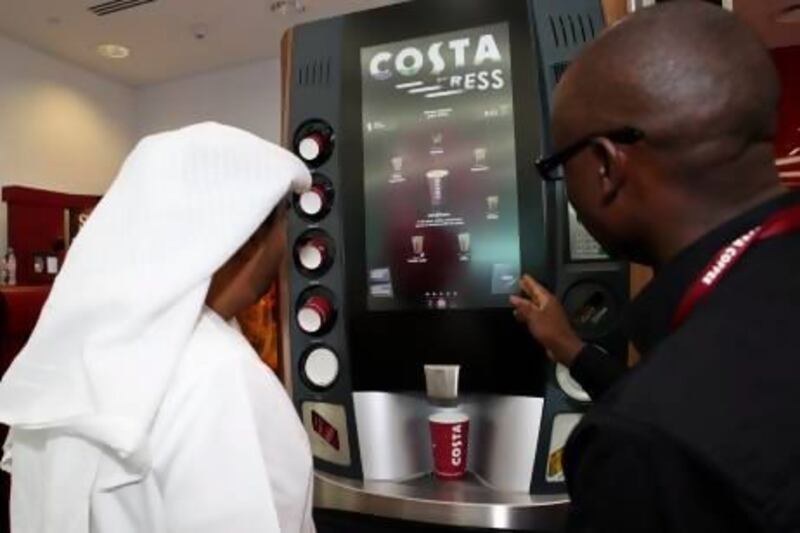Takeaway coffee from a machine. It's not rocket science, is it? With the involvement of an aeronautical design firm in Costa Express's newly unveiled self-serve coffee machine it almost is.
Costa Express, the vending machine division of Costa Coffee, last month unveiled its five senses machine in Dubai International Airport. A machine that can serve 250 varieties of coffee at a finger touch across a screen.
The swanky new Concourse A of Terminal 3 prides itself on introducing new brands and concepts to the travel retail market and Costa's management thought it the perfect place for the Marlow 200 machine's debut.
Named after the English town where the developers agreed to go ahead with the investment and development plan, the machine is designed to appeal to all five senses and take coffee-on-the-run to a more exalted level.
The array of companies involved in the machine's design is impressive. Pininfarina, the Italian automotive and aeronautical technology company, styled the machine's body. EMixpro, which has mixed sound for bands including U2 and Snow Patrol, created the noises reminiscent of a bustling cafe - spoons clinking china, hissing steam - emitted by every unit. The gaming specialist Atomhawk made the 27-inch touch screen. Givaudan and Scentsy, taste and scent engineers, created the aromas and delivery system. And the coffee is made from Costa's Mocha Italia and the milk is fresh.
Its creators say that in blind tests, drinkers are unable to distinguish a Marlow 200 creation and a Costa barista's efforts. And, of course, the operation is much cheaper than running a manned outlet.
The units also have an inbuilt camera that can recognise a customer's sex as well as his or her age bracket so as to tailor its interactions accordingly. (The camera is not activated in the UAE.)
The Marlow 200 has taken 12 years to evolve. Rewind to 1999 when Scott Martin worked for Unilever and spent two days a week commuting in England. The bane of his life was nasty coffee. In the late 1990s, the days before the proliferation of coffee chains, you paid your money and you took your chance on machine coffee: generally a dark brown shot of sludge dribbled into the cup and topped up with water.
"I thought, why can't you get a decent coffee?" Mr Martin says. "It was hot and wet; acceptable but of poor quality."
He went on to found Coffee Nation and by the time it was bought by Costa's owner, Whitbread, in 2011 for £60 million (Dh341.7m) the venture operated half of the 2,000 coffee machines in the United Kingdom that are found mostly in service stations and supermarkets. Coffee Nation was rebranded as Costa Express and Mr Martin stayed on as the general manager of that division. The Marlow 200 is intended to keep Costa Express ahead in the vending game.
The Marlow is simple to use. On the touch screen, the customer selects his choice of drink, decides whether to add a flavour. The drink is prepared and, yes, you can hear clinking and hissing though you have to lean in close to hear given the general hubbub of the concourse. When the drink is ready, a notice appears on screen.
"Your perfectly prepared regular cappuccino is now ready to drink," it read in this case. Sugar and chocolate for dusting is also available.
As the creators predicted, I could not have differentiated between my machine drink and a barista-made drink.
While this is all very novel, is it not a little more than customers want from a vending machine - especially given the "considerable" amount of money it cost to develop? (The Costa team declined to say exactly how much.)
Jonny Forsyth, a drinks analyst at the market research firm Mintel, thinks so. "I'm not convinced it really enhances people's coffee experience to have the sound of steam and people chatting. I suspect it will be a little baffling, and perhaps even a little annoying."
Mr Forsyth does think the data-collecting camera is useful although "this Big Brother element will not be to everyone's tastes," he says. "Where I can see it delivering ROI [return on investment] is that it collects data on people's age and gender via camera.
"As well as allowing it to modify interface options for a speedier and more relevant coffee experience, it will also allow Costa to collect valuable research data which it can use to improve its self-service business."





